

Blogs and Discussion Boards. Introduction Many instructors are using online writing – email, asynchronous threaded discussion groups, and synchronous chat – in their teaching.
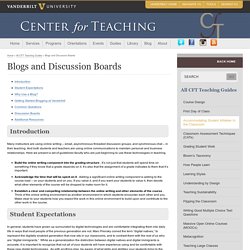
And both students and teachers are using online communications to maintain personal and business relationships. Here we present a set of guidelines faculty who are just beginning to use these technologies in teaching. Build the online writing component into the grading structure . It’s not just that students will spend time on something if they know that a grade depends on it.
Student Expectations In general, students have grown up surrounded by digital technologies and are comfortable integrating them into daily life in ways that most people of the previous generation are not. The annual Educause Center for Applied Research (ECAR) study of undergraduate students helps to shed light on how technology affects the college experience. The survey also reported that students identified these four technology factors that support academic success. 1. Discussion Rubric. University of Wisconsin - Stout — Schedule of Online Courses, Online Certificate Programs, and Graduate Degree Follow us on Facebook.
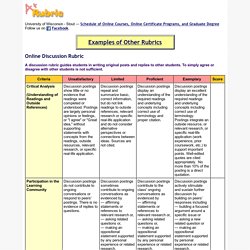
This rubric may be used for self-assessment and peer feedback. * Open class discussion is an important and significant part of an online course. While class discussion whether online or face to face, can be characterized by free flowing conversation, there are identifiable characteristics that distinguish exemplary contributions to class discussion from those of lesser quality. The criteria found on the rubric above will be used to assess the quality of your initial postings and responses to the postings and comments of peers during class discussion.
Discussion Rubrics - Pedagogical Repository. Description While faculty might hope that students can "just discuss" a topic online with little or no support, Beckett, Amaro‐Jiménez, and Beckett (2010) found that "even doctoral students may need explicit grading instructions, and therefore provide rubrics and sample responses while not stifling creativity" (p. 331).
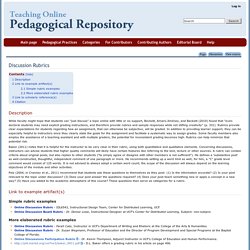
Rubrics provide clear expectations for students regarding how an assignment, that can otherwise be subjective, will be graded. In addition to providing learner support, they can be especially helpful to instructors since they clearly state the goals for the assignment and facilitate a systematic way to assign grades. Some faculty members also employ the assistance of a teaching assistant and with multiple graders, the potential for inconsistent grading becomes high. Rubrics can help minimize that potential risk.
Baker (2011) notes that it is helpful for the instructor to be very clear in their rubric, using both quantitative and qualitative elements. Baker, D.L. (2011). Using Online Discussions to Encourage Critical Thinking - Center for Instructional Technology. How can online discussions be used as a springboard for high level conversations among students in your class?
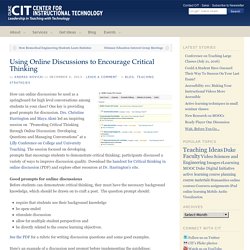
One key is providing good prompts for discussion. Drs. Christine Harrington and Maya Aloni led an inspiring session on “Promoting Critical Thinking through Online Discussion: Developing Questions and Managing Conversations” at a Lilly Conference on College and University Teaching. The session focused on developing prompts that encourage students to demonstrate critical thinking; participants discussed a variety of ways to improve discussion quality.
Download the handout for Critical thinking in online discussion (PDF) and explore other resources at Dr. Good prompts for online discussions Before students can demonstrate critical thinking, they must have the necessary background knowledge, which should be drawn on to craft a post. See the PDF for a rubric for writing discussion questions and some good examples. Writing prompt revised using the guidelines: The Sheridan Center for Teaching and Learning. These questions have been adapted from "Engaging Students in Discussion Online" (from the Teaching and Learning Bulletin 6.2 [2002] produced by the University of Washington’s Center for Instructional Development and Research) 1.
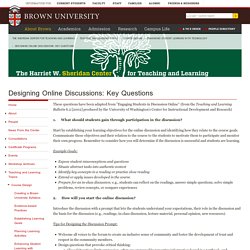
What should students gain through participation in the discussion? Start by establishing your learning objectives for the online discussion and identifying how they relate to the course goals. Communicate these objectives and their relation to the course to the students to motivate them to participate and monitor their own progress. Remember to consider how you will determine if the discussion is successful and students are learning.
Example Goals: 2. Introduce the discussion with a prompt that lets the students understand your expectations, their role in the discussion and the basis for the discussion (e.g., readings, in-class discussion, lecture material, personal opinion, new resources). Tips for Designing the Discussion Prompt: Example Prompt:1. Bringing the Class Discussion Online - More - Project Gallery - UWB Learning Technologies. JOLT - Journal of Online Learning and Teaching. Introduction An ordinary function of any class, online or otherwise, is to teach and engage the students.
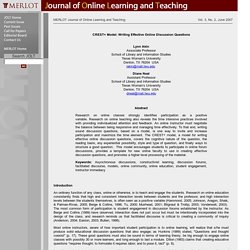
Research on online education consistently finds that high and consistent interaction levels between students and the professor, and high interaction levels between the students themselves, is often seen as a positive variable (Hammond, 2005; Johnson, Aragon, Shaik, & Palmas-Rivas, 2000; Berge & Collins, 1996; Tu, 2000; Muirhead, 2001; Blignaut & Trollip, 2003; Vonderwell, 2003). The most common form of participation is student engagement in discussion forums established by the instructor. As Berge and Collins (1999) have observed, interaction does not just occur but must be intentionally incorporated into the design of the class, and research reminds us that facilitated discourse is critical to creating a community of inquiry (Anderson, 2004; Easton, 2003; Bullen, 1998).
C: Cognitive Nature A question can reflect many theoretical aspects of learning. Textbook Based Literature-Based*